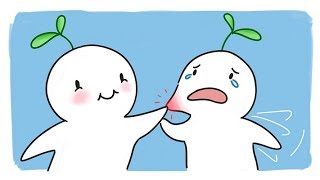In the past, we've published many videos on toxic family dynamics
我们之前发布了很多关于有毒家庭动力的视频,
and some of you have requested that we explore toxic sibling relationships.
一些观众提出要求希望我们讲讲有毒的手足关系。
Our goal is to spread awareness of family dysfunctions and make this difficult topic more approachable.
我们的目标是传播关于家庭失能的意识,让更多人接触到这个话题。
We know that many of our community members are young and may be experiencing domestic trouble.
我们知道我们很多的社区成员都很年轻,或许正经历着家庭问题。
If you're in a situation where you cannot leave your dysfunctional household just yet,
如果你暂时还不能脱离自己的原生失能家庭,
we pray for your safety and want you to know that you can receive help from professionals.
我们希望你能安全,也想让你们知道可以寻求专业人士的帮助。
In our description box below, we've provided some helpful resources that may come in handy such as the National Domestic Violence hotline.
在下方表格中,我们提供了一些有帮助的资源,比如全国家庭暴力热线。
Remember your priority is to keep yourself safe and these resources can help you do just that.
记住首先要保证自己的安全,这些资源可能帮助到你。
Here are 5 types of unhealthy sibling relationships.
以下是不健康手足关系的五种类型。
1. The golden child and the scapegoat.
1. 金童和替罪羊。
These types of siblings often grow up with a parent who is either a narcissist, sociopath or a psychopath.
这种类型的手足,他们的父母通常要么是自恋者、反社会者或是精神病患者。
The golden child is the parents' favorite, because they mirror their values, beliefs and habits.
金童是父母的最爱,因为他们会模仿父母的价值观、信念和习惯。
The parent thinks in black and white and considers this child the good one.
父母总是非黑即白,认为这是个好孩子。
Since the parent lacks empathy themselves, the golden child does, too.
由于父母本身缺乏同理心,所以金童也一样。
They were never yelled at nor punished for treating others with the same cruelty so they assume it's correct behavior.
当他们用同样的残酷对待他人时,父母也不会惩罚他们,所以他们认为这种行为是正确的。
Unlike the golden child, the scapegoat learns to question the parents' black and white thinking.
和金童不一样,替罪羊学会质疑父母非黑即白的想法。
Refusing to follow their illusions, they may be quietly rebellious and seek perspectives other than what their parent enforces.
拒绝沉迷幻觉的他们可能相当叛逆,追寻对待事物的看法,而不是迫于父母的压力。
Consequently, the scapegoat is seen as the bad one in the parents' eyes.
因此,替罪羊被看做是父母眼中的坏小孩。
The scapegoat learns to be empathetic because whenever they challenge the parents' thinking
替罪羊学会了同理心,因为他们无时无刻不在挑战父母的想法
they are reprimanded and told to be more understanding.
他们会被责备,被告知要多些体谅。
While the golden child repeats the same toxic patterns as the parent, just to get along
而金童会重复和父母一样的有毒模式,
the scapegoat tends to break them and searches for a more meaningful life after they leave the family.
替罪羊则倾向于打破它们,在离家之后,会搜寻更加有意义的生活。
2. The Royal brat and the wise owl.
2. 小霸王和聪明的猫头鹰。
The royal brat is spoiled by the parents. They learn to get their way by being loud, manipulative and stubborn.
小霸王得到了父母的溺爱。他们学会了通过大喊大叫、指使他人和顽固得到他们想要的。

The parents usually give in to their tantrums and are more concerned with pleasing them and protecting them from difficult emotions.
父母们通常屈服于他们的脾气,会哄他们,保护他们让他们开心。
Consequently, the royal brat never learns how to work through their impulses, anger nor sadness.
因此,小霸王学不会控制自己的冲动、愤怒或悲伤。
Meanwhile, the wise owl is the complete opposite of the royal brat.
与此同时,聪明的猫头鹰和小霸王完全相反。
The wise owl is mature, responsible and level-headed.
聪明的猫头鹰很成熟、有责任心且冷静。
Since the royal brat always gets their way without having to lift a finger,
小霸王不费吹灰之力就能得到自己想要的,
the wise owl has to achieve the same results through hard work.
而聪明的猫头鹰需要通过努力才能得到同样的结果。
The royal brat tries to take the easy way out by pushing the wise owl to do things for them but the wise owl refuses to yield.
小霸王为了图省事会强迫聪明的猫头鹰帮他们做事,但是他们会拒绝。
Consequently, the royal brat gives the wise owl a hard time.
因此,小霸王会为难聪明的猫头鹰。
Whether the royal brat lacks emotional maturity, the wise owl is disciplined and reliable.
不论小霸王是否缺乏心理成熟,聪明的猫头鹰都很自律且可信赖。
3. The bully and the victim.
3. 欺凌弱小者和受害者。
This relationship is similar to that of a dominant parent and a submissive child but happens in siblings instead.
这种关系与占主导地位的父母和顺从的孩子的这种关系相似,只不过在此是手足。
The bully in this scenario often has a challenging relationship with a parent and feels like they have no control over anything.
此情景下的欺凌弱小者和父母的关系通常具很紧张,而且他们感觉自己无法控制任何事情。
So they learn to be a bully and take out their anger and frustrations on their sibling instead.
因此他们学会了欺凌,将他们的愤怒和沮丧发泄在手足身上。
Usually their younger one who becomes the victim.
通常他们的弟弟或妹妹会成为受害者。
The bully wants to come across as tough and intimidating
欺凌弱小者想要给人留下强硬威吓的印象
so they make the victim feel small and helpless by abusing them emotionally, verbally and/or physically.
所以他们会在情感、言语和/或身体上欺辱受害者,让他们觉得弱小无助。
4. The addict and the enabler.
4. 上瘾者和使能者。
This codependent type of relationship is propelled by an enabler
这种相互依存的关系类型是由一名使能者推动的
who acts as a caretaker for an impaired sibling who usually struggles with addiction or mental illness.
使能者扮演受损手足的守护人,而受损手足通常有毒瘾或精神病。
The enabler protects and takes responsibility further sibling
使能者保护他们并承担照顾他们的责任,
because they feel like their relationship or even their lives will fall apart if they don't.
因为他们觉得如果不这么做,他们的关系或生命会崩塌。
They often think they are looking out for them when they justify their actions,
他们经常认为自己要在他们为自己的行为辩护的时候留意他们,
but in reality it's only hurting the addicts in the long run when their problem isn't fronted.
但事实上,这样做只会伤害上瘾者,因为他们没能面对自己的问题。
Often the addict and enabler already have parents who play similar roles so they learn to mirror them.
通常上瘾者和使能者已经有了扮演类似角色的父母,所以他们会模仿父母。
5. The ghost and the hungry child.
5. 幽灵和渴望的孩子。
The ghost is someone who is emotionally distant from their whole family in general.
幽灵是那些在情感上远离家庭的孩子。
They don't know how to cope with the chaos that happens every day behind closed doors so they fade into the background.
他们不知道如何处理每天发生门后的混乱,所以他们渐渐消失。
Meanwhile, the hungry child always longs to get a little closer to the ghost.
同时,渴望的孩子总是渴望和幽灵更亲近一点。
They lack love and support from the family as a whole and yearn for someone to hold on to.
他们缺乏来自家庭的爱和支持,并渴望有人能紧握他们。
The hungry child often hopes to find love from their sibling but in the end they're usually left with an empty void once again.
渴望的孩子通常希望从手足身上找到爱,但最终他们再次失望而归。
So the hungry child searches for love elsewhere outside their home.
所以渴望的孩子会在家庭之外的世界中找爱。
Do you have a difficult relationship with your sibling?
你和你的兄弟姐妹关系有困难么?
What other types of unhealthy sibling relationships do you know of?
你还知道什么其他的不健康手足关系?
Share your thoughts with us and if you have a special topic requests you'd like us to explore next,
请和我们分享你的想法,如果你有什么话题想让我们去探索
make sure to let us know in the comment section below.
请在下方评论告诉我们。
Also be sure to subscribe to our channel for more helpful tips and share this video with others.
一定要订阅我们的频道获取更多建议,并和他人分享本期视频。
With your help, we can reach more people to spread awareness on dysfunctional family dynamics and mental health issues. Thanks for watching.
有了大家的帮助,我们可以让更多人知道家庭失能和精神健康问题。感谢收看。


